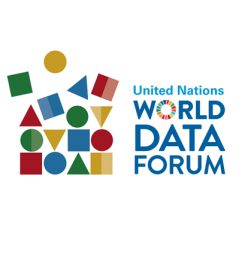Opening session: Harnessing the power of data for sustainable development
22 Oct 2018 02:00h
Event report
Moderated by Ms Mona Chalabi (Data Editor, The Guardian), the panel explored the ways of harnessing the power of data for sustainable development. The panellists shared their experiences with policy making, practical examples and the challenges of using data to achieve the sustainable development goals (SDGs).
Mr Mahmoud Mohieldin (Senior Vice President for the 2030 Development Agenda, World Bank) described the 2013 memorandum of understanding (MOU) on statistical activities between his institution and the United Nations. The MOU focussed on enhancing the availability of data, financing data activities and implementation. Since then, the World Bank has published the Atlas of Sustainable Development Goals. They have also initiated the Human Capital Project that ranks 150 countries on their education, health and survival data.
Mr Omar Al Olama (State Minister for Artificial Intelligence, The United Arab Emirates) drew a comparison between human statistical analysis and artificial intelligence (AI), explaining how technology has the capacity to help humans better understand the world. He explained the importance of data to make more informed decision and achieve the SDGs. He therefore called upon policy makers to invest in understanding technology and tackling policy questions arising from the use of new technologies.
Ms Harpinder Collacott (Development Initiatives) emphasised the need for connections between the data community and political actors. She proposed making use of administrative data such as birth and death records, making data transparent and accessible to all, and improving data communications.
Mr Clint Brown (Director of Product Engineering, Esri) traced the evolution of geographical information systems (GIS), mentioning the silos that existed in data systems and how computing systems such as cloud technology were revolutionising data sharing. He gave examples of GIS, such as Sentinel, that had been uploaded for use, and called for more collaboration and appropriate access to information.
In response to a question on data accuracy, Brown noted that the private sector players have the resources and leeway to experiment and help in meeting the SDGs. He gave examples of commercial players – like his organisation – that were donating technology and skills development to non-governmental organisations.
Mohieldin related to the SDGs’ rallying call, ‘leave no one behind’. He stated that in order to know who was being left behind, there is a need for official identification. He noted that data on people correlated with income levels, with low income countries only having about 40% of their population officially identified. This was followed by middle income countries with about 60%, and high income countries with over 90% identification rates.
Al Olama recalled how development in the past was linked to the availability of resources and talent, and noted that there are countries with resources which lack talent. In this age, data was a major resource and therefore talent was shifting to systems. He was however concerned about responsible development and therefore accentuated the need for inclusion in data processing plans and activities. His views were echoed by Collacott who spoke of the importance of inclusion when monitoring SDGs. She lamented that those likely to be left behind – persons with a disability, women and children – were usually the poorest, hence typically outside official datasets. She said that monitoring should include feedback data from the people, for the people to validate data about themselves.
The session ended with the panellists calling for more frameworks for partnerships. Countries were encouraged to develop policies for data to promote trust in data systems. The need for technical co-operation was underscored, and participants were asked to shift from ‘data for data’ to data for development and data for people.
Related topics
Related event

